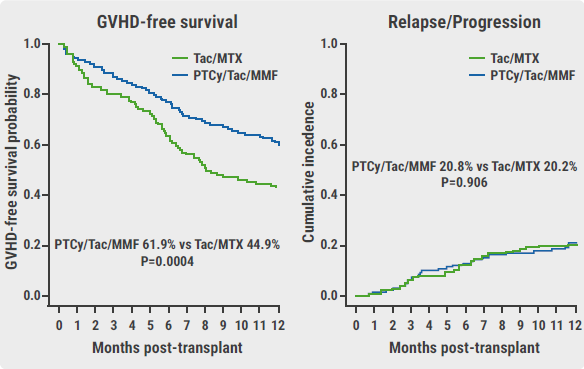https://doi.org/10.55788/04c0273a
Prof. Mark Walters (University of California, CA, USA) presented up to 8 years of follow-up efficacy and safety data of 63 patients with TDT who received beti-cel infusion therapy [1]. Transfusion independence was defined as a haemoglobin (Hb) level ≥9 g/dL without packed red blood cell transfusions for ≥12 months.
The peripheral blood vector copy number (VCN) per cell was stable and durable over time, especially in phase 3 studies, in which patients received optimised beti-cel infusion doses. Similarly, total Hb levels and therapy-derived HbA-T87Q levels were stable and durable (mean of approximately 12 g/dL and 9 g/dL) for patients who were included in phase 3 studies. Prof. Walters showed that the effect was independent of age and genotype. Furthermore, an exploratory analysis suggested that a percentage of 62% transduced cells increased the likelihood of achieving transfusion independence. Finally, 19% of the patients in phase 3 trials had ≥1 adverse event (AE) possibly related to beti-cel infusion therapy. Hepatic veno-occlusive disease occurred in 11% of the patients, but these events were resolved after treatment.
In another presentation, Prof. Franco Locatelli (University of Rome, Italy) reported the 3-year follow-up data of the LTF-303 study (NCT02633943), that investigated patient-reported outcomes in patients with TDT who received beti-cel infusion therapy (n=57) [2]. For patients who had reached transfusion independence, the SF-36 physical component score and mental component score were 55.7 and 56.3 at 3 years, which was a raise from the baseline levels of 53.8 and 50.9, respectively. A slight drop in SF-36 scores was observed in patients who had not achieved transfusion independence. In paediatric patients who reached transfusion independence (n=22), the mean PedsQL total score increased from 78.3 at baseline to 90.6 at 3 years. For those who did not achieve transfusion independence, no change in mean PedsQL total score was reported. Three years after treatment, data showed positive trends in employment/employment seeking rates (67% to 93%), school absence (95% to 50%), and physical activity (+81% improvement).
Thus, durable transfusion independence and quality-of-life improvements were reported in patients with TDT who received beti-cel infusion therapy.
- Walters MC, et al. Long Term Outcomes of 63 Patients with Transfusion-Dependent β-Thalassemia (TDT) Followed up to 7 Years Post-Treatment with betibeglogene autotemcel (beti-cel) Gene Therapy and Exploratory Analysis of Predictors of Successful Treatment Outcomes in Phase 3 Trials. Abstract 2348, ASH 64th Annual Meeting, 10–13 December 2022, New Orleans, LA, USA.
- Locatelli F, et al. Long-Term Patient-Reported Outcomes Following Treatment with betibeglogene autotemcel in Patients with Transfusion-Dependent β-Thalassemia. Abstract 3665, ASH 64th Annual Meeting, 10–13 December 2022, New Orleans, LA, USA.
Copyright ©2023 Medicom Medical Publishers
Posted on
Previous Article
« Neutrodiet: non-restricted diet is the preferred option after SCT Next Article
Durable responses to gene therapy in haemophilia A »
« Neutrodiet: non-restricted diet is the preferred option after SCT Next Article
Durable responses to gene therapy in haemophilia A »
Table of Contents: ASH 2022
Featured articles
Acute Lymphoblastic Leukaemia
Blinatumomab candidate for standard-of-care in newly diagnosed B-ALL
High-dose methotrexate or standard interim maintenance in young patients with ALL?
Acute Myeloid Leukaemia
Excellent results for triplet regimen in FLT3-mutated AML
MRD by qPCR prognostic of outcomes in venetoclax-treated NPM1-mutated AML
Promising results for triplet therapy with magrolimab in AML
Should we use intensive chemotherapy prior to allo-HCT in relapsed/refractory AML?
Chronic Leukaemia
Zanubrutinib wins battle of BTK inhibitors in relapsed or refractory CLL/SLL
Ibrutinib plus venetoclax displays long-term benefits in CLL
Multiple Myeloma
Talquetamab further investigated in heavily pre-treated MM after promising phase 2 data
Promising results of elranatamab for MM in phase 2 MagnetisMM-3 trial
Deep and durable responses for quadruple therapy in smouldering MM
Ultra-sensitive MRD assessment in MM with BloodFlow
CAR-Hematotox score proves useful in relapsed/refractory MM
Head-to-head: VMP versus Rd in transplant-ineligible MM
Lymphoma
Ibrutinib added to ASCT improves clinical outcomes in mantle cell lymphoma
High-dose chemotherapy plus ASCT superior to standard immuno-chemotherapy in primary CNS lymphoma
Odronextamab has considerable anti-tumour effects in relapsed/refractory diffuse large B-cell lymphoma and follicular lymphoma
Excellent results for AFM13-complexed NK cells in CD30-positive lymphoma
CAR-Hematotox score predicts toxicity, infections, and clinical outcomes in MCL
Myeloproliferative Neoplasms
Efgartigimod successful in immune thrombocytopenia
INCA033989: novel investigational agent for CALR-mutated MPN
Ruxolitinib mediates clonal evolution of RAS pathway mutations in MPN
Immune Thrombocytopenia
Long-term risk for haematologic disease in persistent, isolated mild thrombocytopenia
Various Topics
C1 inhibitor deficiency linked to thrombosis
Durable responses to gene therapy in haemophilia A
Long-term benefits from beti-cel in transfusion-dependent β-thalassaemia
Neutrodiet: non-restricted diet is the preferred option after SCT
Iptacopan offers solution for patients with PNH and residual anaemia after standard-of-care
Novel therapy may replace standard-of-care prophylaxis for GVHD
LMWH does not result in higher live birth rates in women with inherited thrombophilia
Related Articles

February 20, 2023
Novel therapy may replace standard-of-care prophylaxis for GVHD
February 20, 2023
Long-term benefits from beti-cel in transfusion-dependent β-thalassaemia
© 2024 Medicom Medical Publishers. All rights reserved. Terms and Conditions | Privacy Policy
HEAD OFFICE
Laarderhoogtweg 25
1101 EB Amsterdam
The Netherlands
T: +31 85 4012 560
E: publishers@medicom-publishers.com

